December 2021 will mark the 60th anniversary of the declaration of Papua’s independence and the beginning of eight years of international coalescence to rob a people of their freedom . . .

December 2021 will mark the 60th anniversary of the declaration of Papua’s independence and the beginning of eight years of international coalescence to rob a people of their freedom . . .